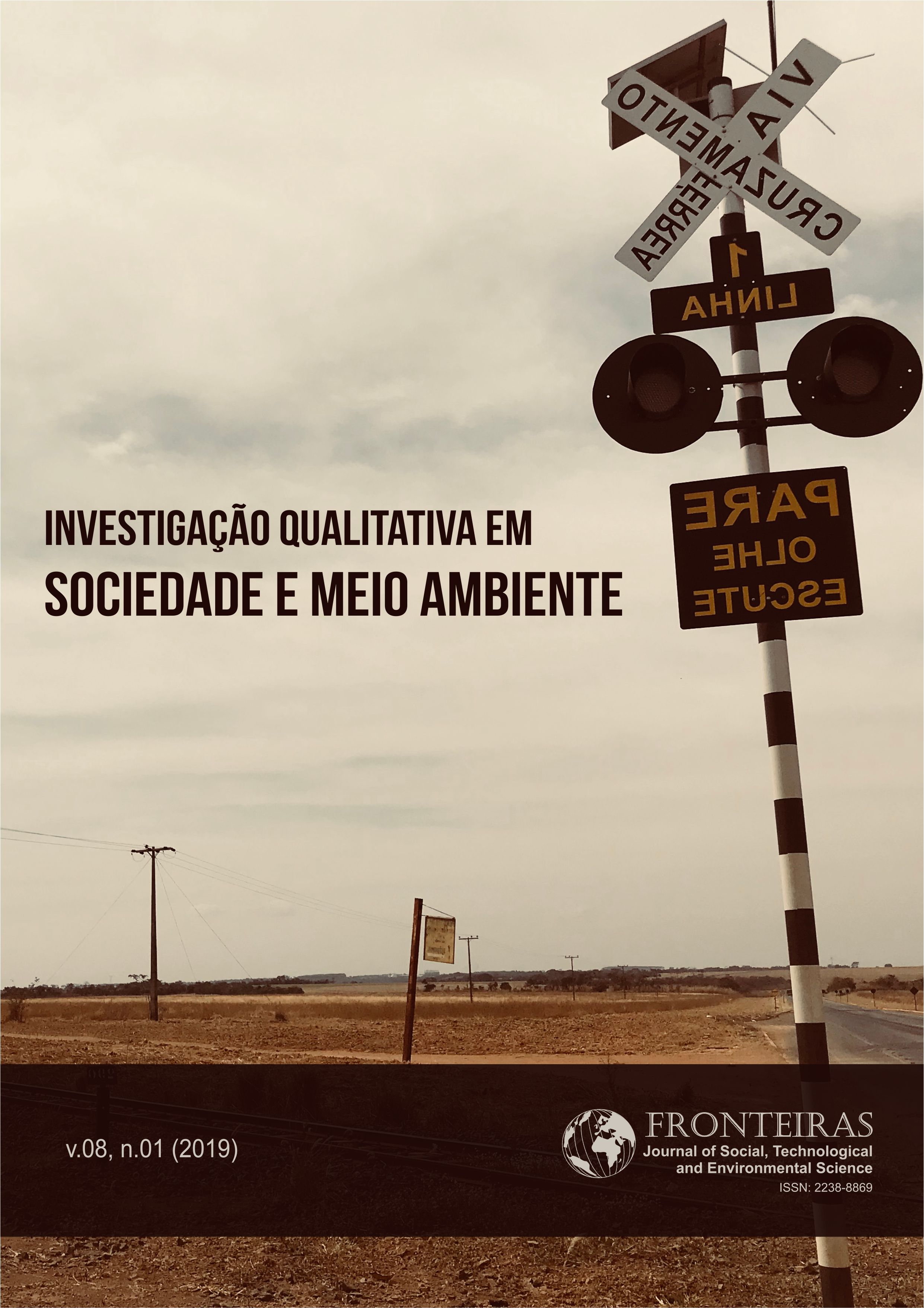Transfrontier Exchange for Modelling Good Practices in Social Intervention Based on PAR: The Case of the Sarea Project
DOI:
https://doi.org/10.21664/2238-8869.2019v8i1.p57-71Palavras-chave:
Desenho Metodológico, Metodologia da Pesquisa-Ação Participativa, Modelo de Pesquisa Qualitativa; Trabalho Social.Resumo
A aplicação da metodologia da Pesquisa-Ação Participativa permite um procedimento científico reflexivo, sistemático e crítico que visa estudar algum aspecto da realidade, da situação-problema, com o propósito expresso de transformar e libertar a comunidade. Este é o desenho metodológico que o projeto transfronteiriço do SAREA selecionou para criar sinergias entre os profissionais do campo de ação social na Espanha e na França e buscar as melhores práticas para capacitar os usuários dos serviços sociais. As oportunidades de troca criadas permitem a possibilidade de os atores compartilharem o que e como está sendo feito, com base em um trabalho reflexivo e colaborativo, aprenderem mutuamente as boas práticas apresentadas. Em seu papel de facilitadores, os órgãos de educação que lideram o projeto procurarão sistematizar o conhecimento co-construído no intercâmbio e estimular o surgimento do "bom modelo de trabalho" que sustenta as práticas apresentadas. O valor agregado dessa cooperação interprofissional traduz a conceituação de práticas para a sua transferência em nível territorial, bem como a construção conjunta de projetos educacionais que proporcionam aos nossos alunos um background que aborde a realidade que eles enfrentarão em suas futuras carreiras de forma criativa, construtiva e colaborativa.
Referências
Arrieta F, Izagirre A, Segú M, Zuñiga M 2018. La comunidad al rescate: algunas reflexiones sobre las políticas estatales de activación comunitaria en Europa . Revista Zerbitzuan, 65:7-11. [cited 2018 jun 9]. Available from: http://www.zerbitzuan.net/documentos/zerbitzuan/La_comunidad_al_rescate.pdf.
Barbero Ferrán JM 2011. Trabajo Comunitario, organización y desarrollo social. Alianza Editorial, Madrid.
Bergold J, Thomas S. Participatory Research Methods: A Methodological Approach in Motion. Forum Qualitative Sozialforschung / Forum: Qualitative Social Research [serial on the internet]. Jan 2012 [cited 2018 may 20]; 13(1):[about 31 p.]. Available from: http://nbn-resolving.de/urn:nbn:de:0114-fqs1201302.
Cifuentes R 2011. Diseño de proyectos de investigación cualitativa. Ed. Noveduc, Buenos Aires.
Coady N 2012. Un enfoque generalista-ecléctico a la práctica del Trabajo Social. In ES Mendicuti (ed.). Epistemologia, teoría y modelos de intervención en Trabajo Social. Reflexión sobre construcción disciplinar en España. Universidad de Deusto, Bilbao, p. 210-345.
Colmenares AM 2012. Investigación-acción participativa: una metodología integradora del conocimiento y la acción. Voces y Silencios: Revista Latinoamericana de Educación, 3(1):102-115pp.
Elliot J 1990. La investigación-acción en educación. Ed. Morata, Mexico.
Fals Borda O 1999. Orígenes universales y retos actuales de la IAP (Investigación Acción Participativa). Análisis Político No. 38, 102(6):71-88.
Freire P 1985. Pedagogía del oprimido. Ed. Siglo XXI, Madrid.
Guzmán G, Alonso A, Pouliquen Y, Sevilla E 1994. Las metodologías participativas de investigación: el aporte al desarrollo local endógeno. Instituto de Sociología y Estudios Campesinos, ETSIAM, Córdoba.
Hernández-Sampieri R, Fernandez-Collado C, Baptista Lucio P 2006. Metodología de la investigación. 4th ed. McGraw-Hill/Interamericana, Madrid.
INTERREG POCTEFA [homepage on the Internet]. ¿Qué es el programa POCTEFA 2014-2020?. [cited 2018 may 3]. Available from: https://www.poctefa.eu/programa/que-es-poctefa/.
Karlsen J, Larrea M 2015. Desarrollo territorial e investigación acción. Publicaciones Deusto, San Sebastian.
Kemmis S 1988. El currículum: va más allá de la teoría de la reproducción. Morata, Madrid.
Lewin K 1946. La investigación acción y los problemas de las minorías. In MC Salazar (coord.). La Investigación-acción participativa. Editorial Popular, España, p. 15-26.
Marchioni M 1988. Del Sistema Educativo tradicional a la Animación Sociocultural. Lecciones de la experiencia internacional. In Fundación Banco Exterior. Una Educación para el desarrollo: La Animación Sociocultural. Fundación Banco Exterior, Madrid, p. 55-62.
Martínez M 2009. Ciencia y arte en la metodología cualitativa. Ed Trillas, Mexico
Max-Neef MA 1993. Desarrollo a escala humana. Uruguay, Editorial Nordan-Comunidad. [cited 2018 feb 3]. Available from: https://www.max-neef.cl/descargas/Max_Neef-Desarrollo_a_escala_humana.pdf.
Sandín MP 2003. Investigación cualitativa en Educación: Fundamentos y Tradiciones. McGraw-Hill / Interamericana, Madrid.
Social Services Law. Ley 12/2008, de 5 de diciembre, de Servicios Sociales. “BOE” núm. 242, de 7 de octubre de 2011. [cited 2018 feb 3]. Available from: https://www.boe.es/eli/es-pv/l/2008/12/05/12.
Taba H 1962. Curriculum Development; Theory and Practice. Harcourt, Brace & World, New York.
Taquette SR, Minayo MC 2017. An analysis of articles on qualitative studies conducted by doctors published in scientific journals in Brazil between 2004 and 2013. Physis Revista de Saúde Coletiva, 27(2): 357-374. Available from http://www.scielo.br/pdf/physis/v27n2/1809-4481-physis-27-02-00357.pdf.
Tax S 1958. The Fox Project. Human Organization, 17(1): 17-19. Available from: https://doi.org/ 10.17730/humo.17.
Downloads
Publicado
Como Citar
Edição
Seção
Licença
Esta revista oferece acesso livre imediato ao seu conteúdo, seguindo o princípio de que disponibilizar gratuitamente o conhecimento científico ao público proporciona maior democratização mundial do conhecimento.
A partir da publicação realizada na revista os autores possuem copyright e direitos de publicação de seus artigos sem restrições.
A Revista Fronteiras: Journal of Social, Technological and Environmental Science segue os preceitos legais da licença Creative Commons - Atribuição-NãoComercial 4.0 Internacional.


